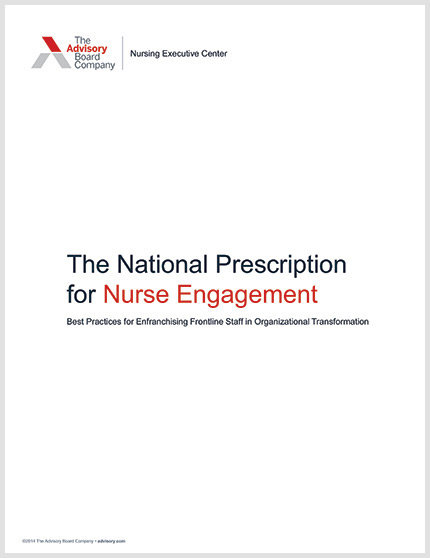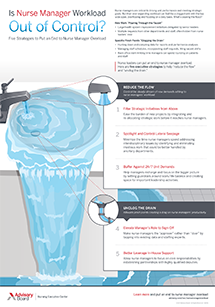Auto logout in seconds.
Continue LogoutEditor's note: This popular story from the Daily Briefing's archives was republished on Feb. 19, 2019.
Burnout impacts as many as a third of all nurses, but there may be a simple way to mitigate the problem—having nurses take an outdoor break in a garden, according to a study published in the American Journal of Critical Care.
Study details
For the study, researchers studied burnout levels among nurses at Legacy Emanuel Medical Center in Oregon for two summers. Nurses were randomly assigned to one of two groups: those who took a daily work break in the hospital's garden for six weeks and those who took daily work breaks indoors for six weeks. The groups then swapped break assignments for an additional six weeks.
At the start and end of each six-week period, nurses took the Maslach Burnout Inventory-Human Services Survey (MBI), which is "considered the gold standard [tool] to measure burnout in health care workers," according to the researchers. The MBI measures the extent of burnout based on three components:
- Emotional exhaustion;
- Depersonalization; and
- Personal accomplishment.
The nurses were also asked to complete the Pediatric Quality of Life Present Functioning Visual Analog Scale (VAS) to measure their immediate psychological symptoms before and after each break. The VAS measures six symptoms:
- Anger;
- Anxiety;
- Fatigue;
- Fear;
- Pain; and
- Sadness.
Results
The researchers found significant improvements in MBI scores for emotional exhaustion and depersonalization among nurses taking garden breaks compared with indoor-only breaks. In particular, nurses had an emotional exhaustion score 4.5 points lower after the six weeks spent in the garden than before (on a seven-point scale). However, researchers found no improvement shown for personal accomplishment scores.
Psychological scores also improved significantly among nurses taking garden breaks compared with those taking indoor-only breaks. Specifically, the researchers saw noticeable improvement in scores related to anger and tiredness.
According to the researchers, many nurses reported feeling "less stressed after getting some fresh air" in the garden. In comparison, many reported that the indoor break rooms were "noisy and crowded," or that they "wished they could be outside."
Discussion
"Taking daily breaks in a garden might be a complementary strategy to other interventions known to mitigate burnout, such as mindfulness-based stress reduction and resiliency training," the researchers concluded. "Although nurses spent less time in the garden than indoors (20.5 vs. 24.4 average minutes respectively), the garden provided greater reduction in burnout."
Roger Ulrich, co-project investigator and emeritus professor of architecture at Texas A&M University, said, "There is a pattern of evidence that suggests that well designed gardens can reduce stress, lower blood pressure, and relax people." He added that anything that can improve staff morale and help nurses cope with the demands of their job could potentially help hospitals provide better quality care. (Knowles, Becker's Clinical Leadership & Infection Control, 11/7; Cordoza et. al., American Journal of Critical Care, 11/2018; Legacy Health release, 11/13).
Learn more: 5 strategies for reducing nurse manager overload
Nurse managers’ success is critical to driving unit performance and meeting strategic goals. But their ever-expanding workload can feel like a clogged sink, with the tap wide open, overflowing and flooding on a daily basis. What’s causing the flood?
Check out our infographic to discover 5 executive strategies to help “reduce the flow” and “unclog the drain.”
Don't miss out on the latest Advisory Board insights
Create your free account to access 1 resource, including the latest research and webinars.
Want access without creating an account?
You have 1 free members-only resource remaining this month.
1 free members-only resources remaining
1 free members-only resources remaining
You've reached your limit of free insights
Become a member to access all of Advisory Board's resources, events, and experts
Never miss out on the latest innovative health care content tailored to you.
Benefits include:
You've reached your limit of free insights
Become a member to access all of Advisory Board's resources, events, and experts
Never miss out on the latest innovative health care content tailored to you.
Benefits include:
This content is available through your Curated Research partnership with Advisory Board. Click on ‘view this resource’ to read the full piece
Email ask@advisory.com to learn more
Click on ‘Become a Member’ to learn about the benefits of a Full-Access partnership with Advisory Board
Never miss out on the latest innovative health care content tailored to you.
Benefits Include:
This is for members only. Learn more.
Click on ‘Become a Member’ to learn about the benefits of a Full-Access partnership with Advisory Board
Never miss out on the latest innovative health care content tailored to you.


